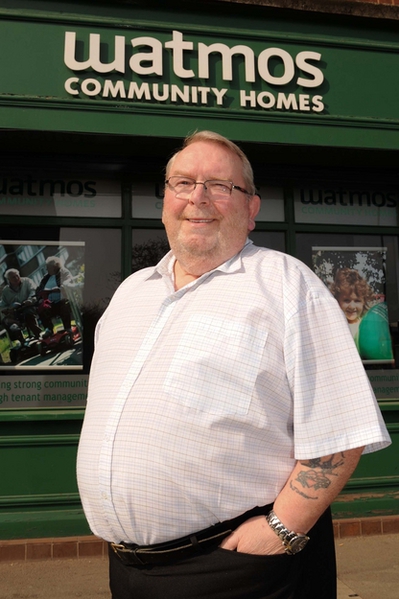Taking control of Walsall
Terry Edis has spent the past 20 years spearheading tenant management in the west midlands. Lydia Stockdale kicks off our regional special by meeting him to find out why
It is often said that self-deprecation is a character trait of people from the west midlands. Terry Edis, chair of both the Walsall Alliance of Tenant Management Organisations and the National Federation of Tenant Management Organisations, has this stereotypical regional idiosyncrasy in abundance.
When Mr Edis, a life-long social housing tenant, is encouraged to speak about his success leading fellow tenants to take control of their own homes and estates over the past 20 years, he downplays his role. ‘Anybody can do it,’ he shrugs.
But the facts speak for themselves. As chair of NFTMO, Mr Edis is one of four national tenant organisation representatives being consulted by the government on policies that will touch the lives of residents up and down the country.
Since 2002 Mr Edis has also chaired WATMOS Community Homes, a housing association formed of eight tenant management organisations operating across Walsall. The only UK organisation of its kind, it took over the ownership and management of 1,700 homes in the west midlands town following a large-scale stock transfer from Walsall Council. While the majority of the local authority’s 26,000 properties were taken on by Walsall Housing Group, the WATMOS TMOs held on to their homes and still manage day-to-day services locally. ‘It’s run for tenants by tenants,’ explains their chair.
Nearly nine years since its formation, the organisation is going from strength to strength and is now on the verge of a national first. Under
Mr Edis’s leadership it is expanding beyond the west midlands and taking on the ownership of 1,400 further homes more than 100 miles away in Lambeth, south London.
Just before Christmas, WATMOS competed with several other social landlords to run these tenant-managed properties in south London and was picked as the favourite. Tenants and leaseholders, whose homes are managed by three TMOs are voting on the transfer of their homes from Lambeth Council to WATMOS, and if they vote ‘yes’ this autumn, WATMOS will take on the stock in April next year.
The housing association is not paying the local authority anything to take over the ownership of the LATMOS homes; however, it will borrow £24 million from banks in order to improve the properties over the first five years. WATMOS plans to plough a total of £100 million into the
London housing stock over a 30-year period.
‘If it comes off it’s going to be absolutely fantastic, not just for WATMOS or the Lambeth Alliance of Tenant Management Organisations [the collective name of the three south London TMOs], but for this as a model for social housing,’ says a hopeful Mr Edis. ‘We set up WATMOS with the thought that any other TMO in the country could join us. [The Lambeth TMOs will] still run exactly the same, but they’ll have the benefit of being part of a larger organisation, so things like IT and HR can be shared.’
If the transfer goes ahead it will be the latest in a long line of accomplishments for Mr Edis. In 2008 the 66-year-old was awarded an MBE in recognition of his work serving his community. His office in the WATMOS Community Homes headquarters, located on the edge of Walsall town centre, is a veritable showcase of his achievements. Framed certificates already cover one wall, and are creeping their way on to another.
It’s clearly not in Mr Edis’ nature to boast, but he is happy enough to explain his motivation in dedicating such a great deal of time and effort
to tenant management. ‘I go all over the country doing talks on it. People say, “Why do you do it, you don’t get paid?” I do it because I want a decent place to live,’ he says.
An inspiration to others
Val Nicholls, chair of Delves West TMO, one of the eight organisations that make up WATMOS, describes Mr Edis as ‘an ambassador for tenants’. ‘We wouldn’t have got to where we are without him pushing us along. He’s an inspiration,’ she says.
On a national level, Mr Edis plays a crucial role, says Nic Bliss, chair of the Confederation of Co-Operative Housing. Mr Bliss is working closely with the NFTMO chair, consulting with housing minister Grant Shapps and his Westminster colleagues on tenant-related government decisions. ‘In terms of what exists to represent tenants in this country, Terry is one of the four [individuals who have access to Westminster],’ says Mr Bliss.
Mr Edis and Mr Bliss, along with Michelle Reid, chief executive of the Tenant Participation Advisory Service and Michael Gelling, chief executive of the Tenants’ and Residents’ Organisations of England - collectively known as the National Tenant Organisations - at least once every three months they travel to and from London to talk with Mr Shapps and other decision makers. Whenasked what he thinks of the housing minister’s progress on tenant-related work, Mr Edis is diplomatic. ‘On some things very good, others need a bit more time to work through,’ he says levelly.
Getting involved
Mr Edis’ work on behalf of tenants began in the late 1980s when he was forced to finish working as the manager of an engineering company after developing osteoarthritis. ‘I came to live on Burrowes Street, in Walsall, which had a tenants group - I had no intention of getting involved whatsoever,’ he smiles.
This changed when Mr Edis, then in his mid-forties, attended a residents’ committee meeting to complain about the lack of heating in his council tower block. ‘I then got dragged into joining,’ he recalls.
The reluctant participant quickly became one of the Burrowes Street tenants who spearheaded the formation of the Burrowes Street Tenant Management Organisation. Every week throughout the early 1990s, he and some of his neighbours trained in areas such as housing law and finance so they could successfully take over the management of the 312 homes on their estate from Walsall Council. The agreement was finally signed in 1994 and Mr Edis was asked by his fellow tenants to become their chair.
‘I think it was because I was born and bred in the area and I wasn’t afraid to express my opinions and views - I’d probably got the biggest gob, sort of thing,’ he says.
Under the TMO, life on Burrowes Street began to improve. Mr Edis points to the string of tower blocks that line the estate through his WATMOS office window. These used to be a hot-bed of anti-social behaviour, he explains. ‘It was terrible in the early days. But setting up the TMO and “getting the tenants on board” helped get this under control. We’ve got 56 CCTV cameras on our estate. But I always say we’ve got more than that - 400 pairs of eyes,’ he says happily.
One by one groups of council tenants living on seven other estates across Walsall saw what was happening on Burrowes Street, and enlisted Mr Edis to help establish similar TMOs. By the end of the nineties there were eight TMOs in Walsall, and Mr Edis led the way as these organisations joined together and formed their own registered social landlord. ‘Walsall Council decided in 2002 that they were going to transfer all of their stock to five housing trusts, which would have split up all the TMOs and we didn’t want to do that,’ recalls Mr Edis. ‘We sat in our community room one night to discuss what we could do. I said we could always look at setting up our own housing association, not thinking anybody would go for it, but they thought it was good idea - and that’s when the hard work started.’
Mr Edis was already a board member at west midlands housing association Accord and had a strong idea of what running an association involved. ‘It was a totally different ball game to what we’d been used to,’ he says.
Yet the tenants pushed ahead with the stock transfer and created an organisation with a 12-strong board, eight places going to tenants - one from each of the TMOs. Mr Edis, for one, believes that the WATMOS model is the way forward. In 2002, under council ownership, just 33 per cent of tenants living in the homes about to be taken on by WATMOS were satisfied with their landlord. By 2009, under the tenant-run housing association, this figure had risen to 92 per cent.
Tenants wanting to follow in WATMOS’s footsteps by forming a housing association and taking full ownership of their homes, but are currently facing objections from their local authority landlords - such as the residents of the West Kensington and Gibbs Green Tenants’ and Residents’ Association in Hammersmith & Fulham, West London, and the Friday Hill Tenant Management Organisation, in Chingford, east London - are currently waiting for the Communities and Local Government department to launch a consultation on regulations that require councils to co-operate with tenants seeking ownership of their estates. Originally this was due to be launched in February but it has been delayed. ‘The document is still being developed and will be published as soon as possible,’ says a CLG spokesperson.
Mr Edis, for one, believes that it makes sense for the government to push ahead and empower residents who want to follow the WATMOS model. Its work is ‘absolutely 100 per cent’ in line with the coalition’s big society and localism agendas, he says. ‘I want to get Shapps and Cameron up here to have a look at our model because it is the ultimate in housing for the big society. Everything is voluntary. Over 100 tenants are involved,’ he adds.
While the TMOs still operate the services on their own estates, most of the WATMOS’s centralised operations have been handed over to paid employees. But Mr Edis still oversees governance, controls budgets and en-sures the organisation is 100 per cent accountable to its customers.
‘I think it’s about accountability; it’s about knowing they can walk up the street and into the office - they know they’ll speak to the staff on a regular basis,’ he says.
Easing the workload
This means the chair himself can take things a bit easier. ‘In the early days we were having to put the time in - now it’s as and when. We’ve got some excellent staff. You’re there to advise and work with them, not to do their work.’
Ursula Barrington, chief executive of WATMOS, says Mr Edis absolutely practices what he preaches. ‘He’s amazing’, she states. ‘He gets involved where he needs to. I know I can always phone him - but he doesn’t interfere in the work he pays me to do.’
In 1994 Mr Edis had a heart attack; he has suffered from blood clots on his lungs twice and now needs to be on oxygen 14 hours a day. Despite this, Ms Barrington says, he can be found in his Burrowes Street TMO office every day. His three daughters would like to see him start taking things a bit easier. ‘They say, “You’re doing too much again”,’ Mr Edis smiles.
But for him, his tenant management work is ‘a lifeline’. It keeps him going, he says. Although Mr Edis is unlikely to ever draw attention to the huge contribution he makes on behalf of his fellow tenants in Walsall - maybe soon in Lambeth - and beyond, his tenant colleague Ms Nicholls is more than happy to do it for him. ‘If Terry were to retire, I don’t know what we’d do,’ she states. ‘It would take several people to take his place’.
Terry Edis on…
Scrapping security of tenure for people in work:
‘If we say to people, “If you’ve got a job you’ve got to move out”, we’re not going to build sustainable communities. People aren’t going to get involved [in their communities ] if in two years’ time they’re going to have to move off. They will say, “Why should I bother?”. So you’re not going to achieve the big society.’
Tenants’ biggest worry:
‘Generally people are concerned about the [housing and disability] benefit cuts - whether we as tenants can do anything about that or not, I don’t know. If the 250,000 people who took part in [last month’s] march in central London against the government’s public spending cuts don’t make the slightest bit of difference, then it beggars belief what can.’
Preparing for tenants to take over the management of their homes:
‘[At tenants’ meetings] I insisted that we went at the pace of the slowest person in the group. We had to make sure that the ones who were a bit slower at picking things up were OK with everything. If this meant we had a couple of sessions on one particular subject, that was fine.’








